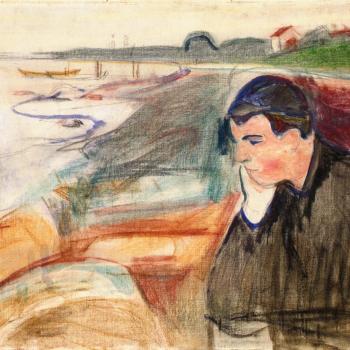
Over a month ago I decided I’d do a series of meditations: one on the “Our Father,” one on the “Hail Mary,” and one on the “Jesus Prayer.” Then my General Exams got in the way, taking me away from blogging for far too long. Finally, I’d like to complete this little chain of reflections.
Why? Predominantly because I initially thought of these meditations as a way to improve my own prayer life, to more deeply involve my mind in the life and workings of the divine. Exams put great strain on the life of the spirit; long-ish morning and nighttime prayer routines turned into a few mouthed words, mostly begging for something like stress-free sanity.
Given this struggle, nothing could be more fitting than a meditation on the “Jesus Prayer,” a beautiful few words far-too-little-known in the Latin West. It reads:
Lord Jesus Christ, Son of the Father, have mercy on me, a sinner.
Simple enough. It is an ancient prayer and, at base, it’s a prayer for mercy, a heartfelt way to beg the Lord for the ability to receive His grace. Within the context of Byzantine theology, this makes a lot of sense—“Lord, have mercy” is perhaps the most common response during the Divine Liturgy of St. John Chrysostom. There is also the lovely (and integral) recognition of one’s own sinfulness, the reality of lack in our own lives, a hunger for the plenitude of the divine. But the real key here is the word “receive.” The most powerful part of the prayer is, in fact, the way in which it opens us to the reality of grace.
As I have written before (riffing on Simone Weil), attention is the most important part of prayer; it is precisely what I began to lack as I mouthed empty words during exam period. My mind was elsewhere: focusing on books, social anxieties, academic pressures—whatever. What I could not commit myself to was the Lord. The “Jesus Prayer,” in its brevity, exists to focus us in just such a way. The Orthodox saint Theophan the Recluse has described it thus:
When we pray we must stand in our mind before God, and think of Him alone. Yet various thoughts keep jostling in the mind, and draw it away from God. In order to teach the mind to rest on one thing, the Holy Fathers used short prayers and acquired the habit of reciting them unceasingly. This unceasing repetition of a short prayer kept the mind on the thought of God and dispersed all irrelevant thoughts. They adopted various short prayers, but it is the Jesus Prayer which has become particularly established amongst us and is most generally employed: ‘Lord Jesus Christ, Son of God, have mercy upon me, a sinner!’
So this is what the Jesus Prayer is. It is one among various short prayers, oral like all others. Its purpose is to keep the mind on the single thought of God. Whoever has formed the habit of this Prayer and uses it properly, really does remember God incessantly.
Since the remembrance of God in a sincerely believing heart is naturally accompanied by a sense of piety, hope, thanksgiving, devotion to God’s will, and by other spiritual feelings, the Jesus Prayer, which produces and preserves this remembrance of God, is called spiritual prayer. It is rightly so called only when it is accompanied by these spiritual feelings. But when not accompanied by them it remains oral like any other prayer of the same type.













